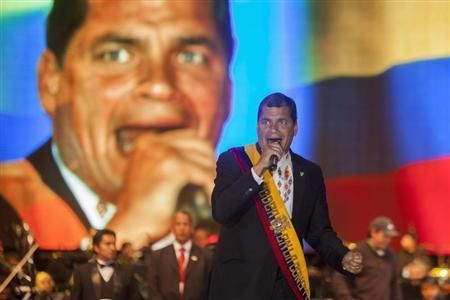
Ecuadorian president Rafael Correa and other top officials announced on Thursday that Ecuador would be waiving preferential trade benefits with the United States available as part of the Andean Trade Promotion and Drug Eradication Act amid US pressure to deny Edward Snowden asylum. In an impassioned speech at an event in the city of Quevedo, Correa accused the US of trying to "delegitimize" Ecuador "for receiving a petition of asylum", which he rejected as "outrageous", adding that "in the face of threats, insolence and arrogance of certain U.S. sectors, which have pressured to remove the preferential tariffs because of the Snowden case, Ecuador tells the world we unilaterally and irrevocably renounce the preferential tariffs".
Communications minister Fernando Alvarez, speaking in a press conference in Quito, said the trade deal had turned into "a new instrument of blackmail". That comment came after US State Department spokesman Patrick Ventrell told reporters that if Ecuador granted asylum to Snowden, it would mean "grave difficulties for a bilateral relationship", and hinted that Congress might not renew the preferential treatment.
RELATED: Venezuela Opposition Leader Henrique Capriles Warns Correa To 'Stay Out Of Our National Affairs'
"They're unilateral trade provisions that provide a benefit to certain Ecuadorian products," Ventrell said, according to CNN. "Whether they're renewed or not is a prerogative of the U.S. Congress."
Correa estimated the potential economic losses to be in the area of $23 million and called it a "pittance" for a country with a GDP as large as that of Ecuador -- in 2011, according to the World Bank, its GDP was just shy of $66 billion, and it has been growing healthily since then. Ecuador exported $5.4 billion of oil, $166 million of cut flowers, $122 million of fruits and vegetables and $80 million of tuna to the United States in 2012 under the Andean trade deal, according to the Chicago Tribune. The trade deal waives duties on certain Ecuadorian goods in exchange for anti-drug-trafficking measures. That deal and, more broadly, the US Generalized System of Preferences (GSP) will expire at the end of July, though the US Congress can choose to renew them. Almost half of Ecuador's exports go to the United States - hundreds of millions of dollars' worth, according to the Associated Press - despite large oil resources and recent efforts to strengthen economic ties with China.
RELATED: Correa Sworn In For Unprecedented Third Term
Ecuador, meanwhile, is still evaluating Snowden's request for asylum as the NSA leaker continues to hide out in Russia, where Vladimir Putin says Snowden is still a "free man". Ecuador said on Thursday that it had not supplied any travel document or diplomatic letter to Snowden and that his asylum request had not been processed, since Snowden was not in Ecuador or at an Ecuadorian embassy or consulate, as the country's law requires. A document leaked to Univision on Wednesday, however, did reveal that a safe conduct pass had been issued for Snowden by someone at Ecuador's London consulate as Snowden prepared to take a flight out of Hong Kong.
RELATED: Will Correa Give Snowden Asylum?
The Guardian reports that officials at the press conference also offered a jab at US critics of Ecuador's human rights record - the Committee to Protect Journalists has said his government engages in "widespread repression of the media" - by offering to donate $23 million in human rights training to the US.
© 2025 Latin Times. All rights reserved. Do not reproduce without permission.




